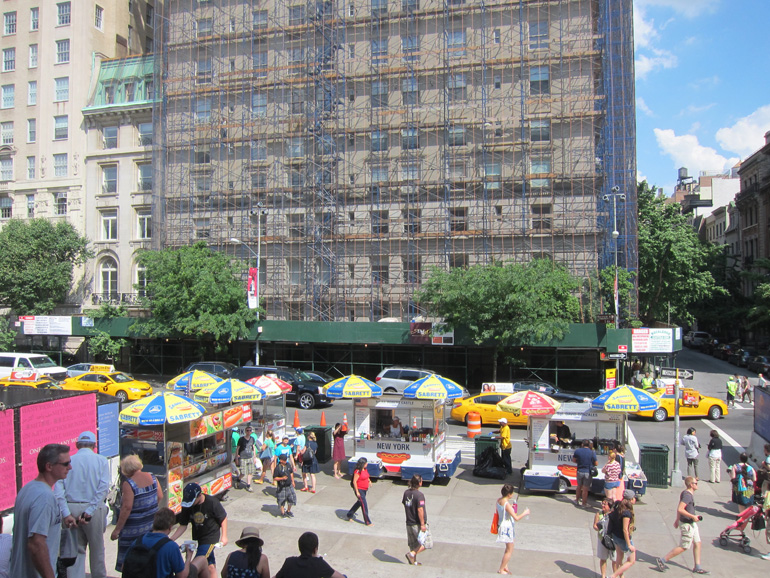Gotham Diary:
We Are All Insiders
16 July 2013
Something is bothering me. I don’t know what it is, but it’s making me impatient and irritable. Certainly the subway-station construction is a factor. I went to Fairway last night to pick up some deli food that I wouldn’t have to cook and that we could eat cold. A simple walk across the street. But the street is anything but simple. The sidewalks have been narrowed, and the walkways that take the place of completely obliterated sidewalks, such as the one in front of our building (whose foundations stand exposed in the pit where the station access will be placed), are constricted and not infrequently work sites themselves. Workers swarm about like invading Goths, while traffic police try to unwind the snarls of pedestrians and turning vehicles. The heat intensifies the unpleasantness. The intersection of Second Avenue and 86th Street is a deeply unpleasant place right now. Construction projects ought not to be so blithely uncivil. I worry that I won’t live to see it cleared up.
So, that’s one thing. But there must be more to it, because I blew up this morning, went barking mad in fact, when I read Adam Ross Sorkin’s story about greed on Wall Street. What drove me crazy was the shocked, shocked tone of Sorkin’s piece. It seems that a partner at a law firm commissioned a survey of 250 Wall Streeters.
While the results may not be scientific, they are stark. For example, 26 percent of respondents said they “believed the compensation plans or bonus structures in place at their companies incentivize employees to compromise ethical standards or violate the law.â€
There is a view that the ethical problems come from the very top: 17 percent said they expected “their leaders were likely to look the other way if they suspected a top performer engaged in insider trading.†It gets even more troubling: “15 percent doubted that their leadership, upon learning of a top performer’s crime, would report it to the authorities.â€
There is nothing acceptable about these responses.
The last sentence blew my top.
Do I think that greed is good? No, but I think that it’s normal, and I’m exasperated by the pious pretense that Wall Street bankers are committed, or supposed to be committed, to high-mindedness and putting their customers first. After World War II, the government and Wall Street spokesman tried to sell the idea that retail capitalism is a good idea. Ordinary people were encouraged to invest their savings in shares of American companies. They were assured that Wall Street was not rigged against them, and the rules against “insider trading” were flown as a banner. The playing field was allegedly level.
Piffle. It not only wasn’t level but the attempt to level it ought never to have been undertaken. It is high time to drop the Cold-War charade. Wall Street ought to be draped with red flags emblazoned with cautions. Retail investors ought to be steered into highly-regulated investment companies (mutual funds) and ETFs. What we call retail brokerage ought to be limited to high net-worth clients who are deemed, by their very wealth, to be insiders; ergo, no more “retail.”
All I ask of bankers is that they not steal deposits. All I ask of the government is to replace the Glass-Steagall Act.
Insider trading is an element in some genuinely fraudulent acts, such as front-running and dumping. But merely taking advantage of information that has not been made public, and buying or selling shares for one’s personal account, seems to me to be an entirely valid perquisite of working on Wall Street. I reject the distinction between “inside” information and rumor. The distinction is a nice one, but it serves no worthy purpose. Information of any kind is the oxygen of Wall Street, inhaled in huge quantities by every trader of any kind. To sticker one particular type of information with a penalty warning is artificial. By “artificial,” I mean that it will never have more intrinsic meaning for traders than the prohibition on that piece of fruit in the Garden of Eden. Let’s stop playing God. Instead of penalizing human nature, we need to civilize it.
Behind the hypocrisy about insider trading lies the intensifying American dissonance between empty-headed campaigns for public virtue and a depraved popular culture.

